#unique mothers day gifts
Explore tagged Tumblr posts
Photo

Mother’s Day is a special day celebrated across the world, including India, to honor and appreciate the love and care of mothers. This Mother’s Day, surprise your mom with a fashionable gift that will make her feel extra special. Here are five fashionable gift ideas that are sure to put a smile on her face.
Sarees are an integral part of Indian culture and a timeless piece of clothing that can make any woman look elegant and beautiful. Gifting your mom a beautiful saree is a thoughtful and meaningful gesture that she will cherish forever. You can choose a saree that matches her personal style and preferences, whether she likes traditional or modern designs.
#Mothers Day Gift#mother&s day#mother&s day gift ideas#mothers day ideas#moms mother day gifts#good mothers day gifts#best mother&s day gifts#gifts for mothers#unique mothers day gifts#mom gift ideas#great mothers day gifts#best mom gifts
1 note
·
View note
Text
Artemis will disassemble and clean a fountain pen with the same level of intensity as Butler disassembling and cleaning one of his guns.
#artemis fowl#Artemis will just automatically include the upkeep of Butler's his mother's Juliet's and Holly's fountain pens in the upkeep of his own#Holly and Juliet tend not to use their pens often (which they have because Artemis gifted them pens) so Artemis will help whenever they vis#visit. Then with Butler it is largely due to the man not having the habit of building 'frivolous' rituals of care into his day so Artemis w#will care for the pens as Butler does (at the end of it all) adore the devices#with Angeline I feel Artemis is just so wholly dedicated to that kind of small act of care when it comes to his mother#(thinking of him composing a unique ringtone for her calls)#I think Fowl Sr is more of a ballpoint pen or a pencil fellow and Artemis will sometimes include his father in the hobby by cleaning#and repairing pens in his father's study while the man works (so he will have the experience of being included through the upkeep)#Tim does appreciate when Artemis shows off some of the special/exclusive inks he purchases#he finds the beauty of the ink a much more accessible aspect of the hobby#that diane ackerman quote about crying in a museum while looking at a piece of yellow sulfur and thinking about how lucky we are to live on#a planet of a natural yellow that is so marvelously yellow#Artemis will do ink tests (when you get a new ink and experiment with it on good quality paper) when his father is in the room for this rea#reason
245 notes
·
View notes
Text
Danger! High Voltage!!!
#buymefur#fur#furcoat#furlover#furlovers#fur coat#furlove#fur fashion#fur vest#fur hat#bootfetish#thickfurlover#furfetish#fur baby#furfashion#genuine fur#natural fur#real fur#unreal fur#artificial fur#furfetishist#furaddict#furaddiction#gift#mothers day gift#gift ideas#christmas gift#unique gifts#holiday gifts#birthday gift
28 notes
·
View notes
Text

Celebrate Mother's Day 2024 with style at RS Designs & Beadwork on Etsy!
Explore our handcrafted beaded jewelry pieces, each designed to capture elegance and charm. Enjoy our special 20% sale running until Sunday, May 12th.
Treat Mom (or yourself!) and use code BESTMOM24 at checkout at Ravit.Etsy.com for exclusive savings! 💖
#beadedjewelry#beadwork#etsyartist#artists on tumblr#online shoppping#etsystore#jewelrydesigner#beadedbracelets#beadednecklace#beadedearrings#mothers day#handmadejewelry#unique gifts#colorful art
59 notes
·
View notes
Text

78 notes
·
View notes
Text
The Chilling Testimony of a U.S. Neurosurgeon Who Went to Gaza to Save Lives
Haaretz: Netta Ahituv May 9, 2024
When everyone who was able to flee from Gaza was doing so, Dr. David Hasan made the reverse journey. His story is a must-read for every Israeli
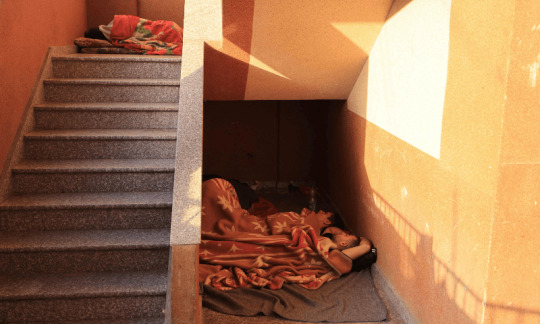
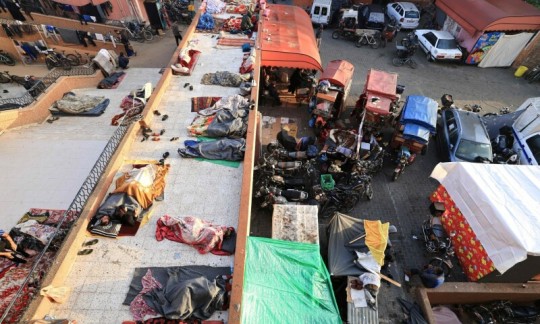
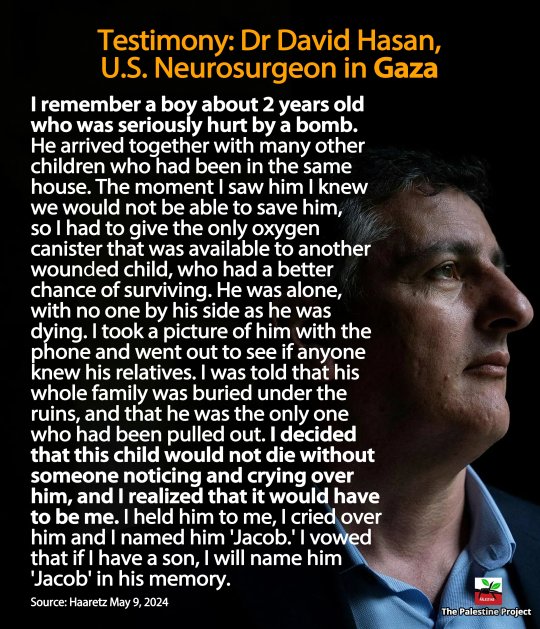
At the end of December 2023, when everyone who was able to flee from the Gaza Strip was doing so, Prof. David Hasan made the reverse journey. Hasan, a senior neurosurgeon and an esteemed researcher at Duke University in North Carolina, decided to fly to Cairo and from there to make his way to Rafah and enter Gaza.
"Until the war broke out, I was focused on advancing my career and taking care of my family," Hasan, who is 50, tells Haaretz in a video interview. "But this situation – which touched me from both sides [of the border] – overwhelmed me emotionally and pulled me in. I felt I had to do something to help."
Hasan was a member of the first medical team – consisting of 18 physicians from the United States, Canada and England – to enter the Strip after the start of the war. They arrived through Rahma Worldwide (an American humanitarian organization) and the organization Medical Aid for Palestine, under the auspices of the United Nations and the World Health Organization.
"The UN and WHO facilitated our entry and assisted with regard to the medications and surgical equipment we brought with us," Hasan says. "But they also informed us in advance that once we entered Gaza, they would have no way of providing us with protection." The doctors were asked to sign a document waiving the UN of any responsibility for their welfare, which, he says, "made the situation all the more threatening."
Their mission was to get to the European Gaza Hospital, near Khan Yunis in the southern Strip, and spend a week there performing surgery on adults and children. Then, less than two months ago, Hasan entered Gaza again on a similar mission, and saw firsthand the transformation that had taken place there since his previous visit.
"The first thing you see in Rafah," he relates, "is miles and miles of hanging fabrics – the tents of the displaced people, which are erected against the background of the ruins of buildings. When you turn onto Saladin Road, which is the main road connecting Gaza's north and south, suddenly you see an ocean of people. These are the displaced people who live there now. As you get closer to the hospital, you see more and more people, and more and more tents."
The hospital itself looked like a refugee camp, Hasan says. "I was confused, because I had never seen so many people living inside a hospital. Every corner there was occupied by a group of people. They made use of every available item – a small curtain, a staircase, a plastic chair – and turned it into their living space. Entire families huddled on squares of two meters by two meters, and ate, drank and slept there. Walking in the hospital, you had to be careful not to step on people."
On the day he entered the Gaza Strip in December, Hasan notes, he didn't see Israeli troops or hear explosions. "I thought the war was in some kind of lull. But as soon as evening fell, heavy shelling started, and I realized that there were many Israeli forces around the hospital – you just don't see them during the day. The noise of a one-ton bomb is deafening. The first time one was dropped nearby, I happened to be standing on a stool, and I fell off, because the building shook so hard. It went on like that every five or 10 minutes. I asked the local doctors what to do, and they told me that you get used to it and that I should just keep working to distract myself from the anxiety."
Where did you sleep? What did you eat?
"I slept in the hospital, ate mostly energy bars that my wife and daughter had packed for me, and drank mineral water. The water situation there worries me the most, and since returning for the first time, I have talked about water sanitation everywhere and with everyone I can. We lost many patients due to water-related infections."
Immediately upon arriving at the hospital, the physicians began operating. "In the process, we discovered that there weren't enough anesthetics, not enough equipment and not even clean water to wash our hands between operations. Sometimes there were no gloves and sometimes we lacked basic medicines. We were compelled to perform limb amputations without anesthetics and C-sections without sedatives. In order to do as much as we could, we would operate on two patients at the same time in the same operating room."
Throughout his first week there, Hasan relates, there was constant, heavy shelling. "During the night, it was not possible to rescue anyone from the ruins, both because there was no electricity and everything was dark, and also because just being outside was dangerous. So people who were wounded during the night remained where they were until morning. Many of them died from loss of blood or reached us in worse condition because they did not receive immediate treatment. Every morning around 8, a wave of wounded people arrived who had been rescued from the ruins of the night. At that point, around nine out of 10 of them could not be saved.
"The hospital has only 250 beds, so at any given moment, you have to make difficult decisions, as there were about 1,200 wounded. He can be saved, she can't, this wound requires resources that we don't have, we may be able to treat this wound. The feeling is that it would have been possible to save many of the wounded if we had more medical equipment, intensive-care beds and the possibility of hospitalizing them for further treatment."
Are there any of the wounded whom you remember in particular?
"From a medical point of view, I remember a boy of maybe 12 or 13 years old, who arrived with bleeding from his eye, from being hit by shrapnel. It was clear that he needed surgery, but there was a two-hour line for the operating room. During the wait, a main artery burst inside his brain and blood began spurting from his eye. I'd never seen anything like that before. He died, of course.
"From a humanitarian point of view, I remember a boy about 2 years old who was seriously hurt by a bomb. He arrived together with many other children who had been in the same house. The moment I saw him I knew we would not be able to save him, so I had to give the only oxygen canister that was available to another wounded child, who had a better chance of surviving. He was alone, with no one by his side as he was dying. I took a picture of him with the phone and went out to see if anyone knew his relatives. I was told that his whole family was buried under the ruins, and that he was the only one who had been pulled out. I decided that this child would not die without someone noticing and crying over him, and I realized that it would have to be me. I held him to me, I cried over him and I named him 'Jacob.' I vowed that if I have a son, I will name him 'Jacob' in his memory.
"Another case I remember is of three siblings – a 10-year-old boy, a 6-year-old girl and a baby boy of one and a half. According to what I was told, they had been in a house that was surrounded by Hamas activity. Israeli soldiers entered the house at night. In the dark, they thought the father was a Hamas operative and they killed him. The mother ran toward the father and she was killed too. The two parents lay there dead, but outside there was bombing taking place. The three children lay down on their parents until the sun came up. Not until morning did people come to take them out of the house. Someone brought them to the hospital.
"I remember that the eldest son held the little one and calmed him because he was crying, and at the same time took care of his sister, who didn't stop shaking like a leaf in a storm. They were covered with their parents' blood. We cleaned them and I brought them some toys and small dolls that my daughter had asked me to give to the children in Gaza. When I gave them the toys, I saw a small smile and they said to me, 'Thank you, Uncle David.' You could see that they were educated and polite children. I was relieved to learn that at some point a relative came and took them. I will never forget them – the thought of the shocking night they went through and the way the 10-year-old, the senior among them, suddenly became a parental figure."
David Hasan was born and raised in Kuwait to a Muslim Palestinian family, who had immigrated there from the West Bank in 1967, following the Six-Day War. It would not be the family's last war-induced emigration. The second time was in the Gulf War, in 1990, when they relocated from Kuwait to Jordan. Hasan, who had always dreamed of becoming a doctor, was accepted to premed studies in the United States and moved there alone at the age of 18.
Where did your unusual combination of names come from – a Jewish first name and an Arab surname?
"When I moved to the United States, I connected mainly with Jews and Israelis, and they helped me acclimate. They accompanied me through various crises, and I decided to change my name from Emad to David. I also had two Jewish girlfriends, one of whom I accompanied on a visit to Israel. By then, I already had an American passport, but in Israel they wouldn't let me enter and wanted to deport me on the next flight to the United States.
"This was a traumatic experience for my girlfriend, so I insisted on talking to the security manager and told him that instead of kicking me out, they should give me a prize. 'A prize? Why should I give you a prize?' he asked. I replied that thanks to me, my girlfriend had come here for the first time in her life. Jewish donors and the State of Israel pay so much money for Jews from all over the world to visit Israel, and here I was, at my expense, inviting a Jewish woman who would never have visited here if I hadn't insisted on it. He went off, muttering, 'It's only in fucking America that Palestinians go out with Jews.' After a while, I was informed that I could enter Israel. Other than that episode, I remember the visit fondly."
Hasan is married to Lauren Hasan, who worked as a trauma surgeon, and they have a 7-year-old daughter. They live near Duke, a private university in Durham, North Carolina. Hasan does clinical work, research and teaching and is considered a leading expert in the field of cerebrovascular disorders and brain-tumor surgery. He has published more than 270 scientific articles in major journals.
Hasan does not hesitate to attest to his love for Israel and Israelis, and talks about close friends in the country. He also has close ties with the Israeli NGO Physicians for Human Rights and with the Arava Institute for Environmental Studies, with both of which, together with UNICEF (the United Nations Children's Emergency Fund), he is trying to promote emergency water purification projects in Gaza. They have already received approval from Israel's Coordinator of Government Activities in the Territories and a promise of funding from USAID.
Asked how he reconciles the Israeli-Palestinian dissonance in his life, he replies simply, "I distance myself from groups that label the Israelis as only one thing and the Palestinians as another. I focus only on moral actions and on ways in which I can help practically."
American universities, including Duke, have become an arena of protests over the war. How do you deal with this?
"We launched an initiative at the university that offers all students the opportunity to be active in assisting victims of the war in all kinds of ways, as they wish, on whichever side they choose. We thought this would allow people to channel their anger into action instead of protesting and arguing among themselves. So far, it seems to be working well. I have already brought in Duke students – Palestinians and Jews – to be part of the water project and work together as a team. I tell my medical students that just as doctors are expected to be blind to their patients' origin, skin color, religion or gender, their attitude toward victims of war should be the same – I suggest to them to think about human beings and not about 'sides.'"
Hasan practices in his life what he preaches to his students. He went to help the Gazans, but the Israeli hostages in the hands of Hamas haunt his thoughts, and he brings up the subject frequently during his interview with Haaretz. On his first visit to Gaza, Hasan hoped he would be able to pressure the appropriate people to talk to members of the Hamas leadership to allow him to visit captives in order to assist them medically. He was warned that even raising the subject would endanger him and the entire delegation, but he insisted. In any event, it didn't happen, of course. No one knows if the request even reached any Hamas officials. Again, in his second visit to Gaza, in March, he put out feelers about the possibility of offering the captives medical aid. Once more, to no avail.
"I walked around the hospital and looked, searched and asked everyone I could if they had seen, heard or knew anything about them [the Israeli hostages]. I also looked for people with weapons, who might be guarding some room, but I didn't see anything like that either. As someone who saw what Gaza looks like aboveground, I can only imagine how terrible the conditions are for the hostages. I assume they don't get enough food, access to a shower or medical services. I also read the testimonies about sexual assault. God knows what condition they are in. I feel pain for them and their families and wish for their release as quickly as possible."
On the last day of the first trip to Gaza, Hasan began sweating and developed a fever. Once he left the Strip, he found out that he was infected with COVID-19, although he had of course been vaccinated. On the second trip, too, he returned home with a mysterious virus. "The situation in Gaza is the perfect storm for viruses – a combination of wounds that become infected because they cannot be cleaned properly, hospitals without proper sanitation and an absence of antibiotics. Add to that water unfit for drinking and a generally appalling sanitary situation. Almost every person we operated on died a few days later, due to infection. It suddenly came to me that surgery was like a death sentence for them. At one point I asked myself what I was doing there if I couldn't save people."
And what was your conclusion?
"That I should continue to do my best. Even if I saved one person, it is still worth the effort. From Judaism I learned that whoever saves one soul, it is as though he saved an entire world. I wanted to be a part of the hope in this conflict and make a difference, even if a small one, for the people who were hurt in it and are considered 'collateral damage.'"
What did you feel when you left the first time?
"Leaving is a bittersweet moment. On the one hand, it's a relief, and on the other hand, I was heartbroken and felt guilty for leaving these people, who need me. I have the option to leave, they don't. From being faceless numbers that I read about in the news, they became for me human beings with names, stories, aspirations and dreams. My consolation is that at least they saw that there were people who cared about them, people who had come a long way and were risking themselves for them, and maybe that would give them hope. I told them that although my body was leaving Gaza, my heart was staying there with them."
In mid-March, some two and a half months after the first visit, Hasan arrived in the Gaza Strip again. This time it was through Medtronic, one of the world's largest producers of medical devices, which was shipping equipment into Gaza. "On Friday I performed a complex operation at Duke Hospital, and within hours I was on my way to Cairo, with half a million dollars worth of medical equipment," Hasan relates. "In Egypt, I was able to get another ton of diapers and baby food, and then went on to Rafah."
There was a palpable difference between the two visits, Hasan relates. To begin with, the second time, there were fewer bombs falling, and they were smaller. On the other hand, however, he encountered more hunger and a higher density of displaced people. "I saw people who had clearly lost a great deal of weight and many more cases of infectious diseases. Mothers arrived with no milk to feed their babies, they were so weak. I remember one woman in her late 20s, an engineer by profession, who told me, 'Dr. David, my baby is crying and I can't do anything. You know Israeli women, right? Maybe you can appeal to them, in the name of the solidarity of women and mothers, to get them to request that at least we can have food for our babies sent to us? Tell them that here too there are mothers with feelings and aspirations for their children.'"
On the second visit, there were fewer medical staff evident, Hasan recalls, and those who were there showed signs of extreme burnout. "They don't earn money, their children are dying at home, and in addition, every trip to the hospital and back entails risking their life or getting bad news from home. Two doctors who worked alongside me returned home after a 24-hour shift and found that their families were buried under the ruins of the house they were in. Many of them felt that they had done their part and now had to worry about the survival of their own families. Those who remained were so exhausted that they developed indifference. A wounded person would arrive, and they would say it was preferable for the person to die, because we didn't have the means for taking care of him. I will not forget taking care of a 5-year-old boy with burns all over his body, who himself told me, 'I wish I was dead. ' At some point I also started to think that it would be better like that, because to be born a weak baby in Gaza means suffering a death sentence in agony."
In addition, Hasan relates, "There was a feeling of chaos, that things were much less organized than last time, that there was no authority or hierarchy. Everyone is worried about their own survival, hunger has an effect, and all kinds of groups were taking advantage of this situation in an awful way. Patients now began arriving who had been shot by [other] Palestinians in fights over food. Imagine hungry people who haven't eaten in days and have children to feed. They will do anything to get food."
The chaos Hasan describes almost cost him his life. On the way from Cairo to Rafah, the Egyptian driver asked him to deliver a bag of sweets to a Palestinian family he knew in Gaza for the Ramadan holiday. Hasan agreed and asked the driver to tell the family to look for him at the hospital. But when he arrived to collect the medical equipment at the border crossing, he discovered that it was not one bag but three huge sacks of sweets. It was certainly not a gift for a family.
He went up to one of the guards at the border, explained the situation and asked him for his advice. The guard explained to him that Egyptian and Gazan merchants were trying to take advantage of the situation to sell things at high prices – the goods he had might fetch thousands of dollars on the black market. He suggested that Hasan leave the sweets there and promised that he and his colleagues would distribute them for free to children for the holiday.
"On the way to the hospital, my phone kept ringing," Hasan recalls. "It turns out that these were the people to whom I was supposed to deliver the sweets. That night, at the hospital, about 10 people with guns suddenly appeared and demanded the candy. They said they were members of Hamas, but later it turned out that they weren't, they just wanted to scare me. It was actually a family that had seized control of a share of the black market. They told me that they knew my name was David and that I was actually an Israeli."
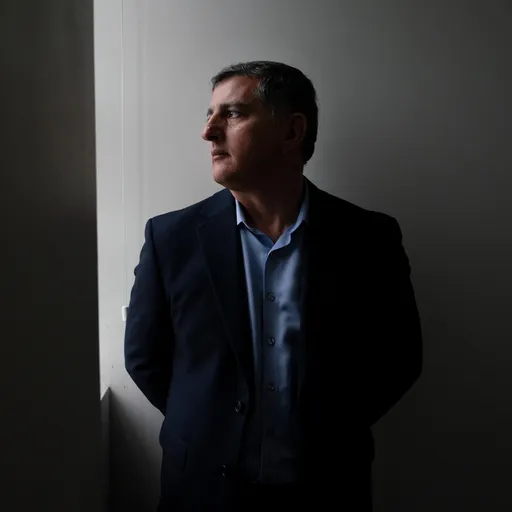
Hasan. "I walked around the hospital and looked, searched and asked everyone if they had seen, heard or knew anything about the Israeli hostages." Allison Joyce/AFP
The Chilling Testimony of a U.S. Neurosurgeon Who Went to Gaza to Save Lives Haaretz Netta... | Middle East (similarworlds.com)
Detroit doctor has never seen anything worse than crisis he witnessed in Gaza
Detroit doctor has never seen anything worse than crisis he saw in Gaza (freep.com)
Facebook
youtube
#genocide#gaza#palestine#free palestine#news#medical#humanitarian#humanity#human rights#war crimes#crimes against humanity#euronews#isreal#Dr. David Hasan#neurosurgery#Youtube#bafta awards#aurora borealis#jacob anderson#mothers day#unique gifts#david tennant#baftas#bafta 2024#eurovision#c4news#bethlehem#ethnic cleansing#doctor who#formula 1
28 notes
·
View notes
Text
#mother#mother's day#mother's love#mom gift#unique gifts#gift ideas#gift#gift for her#gift for mom#gift for wife#mothers day#words#funny stuff#funny#funny memes#lol#funny gifts#coffeeaddict#coffee aesthetic#cup of coffee#coffee#iced coffee#cafe#cappuccino#coffee mug
12 notes
·
View notes
Text
This is gonna be the next print available on Etsy! Coming soon! 🍊🍊🍊
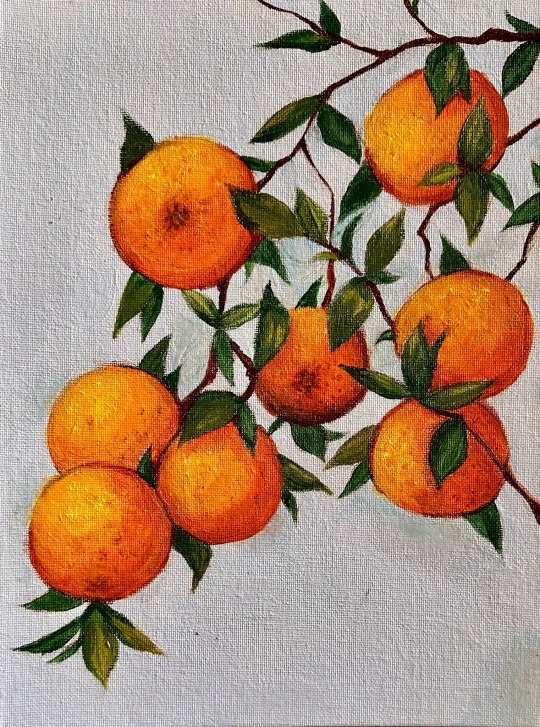
#oranges#fruit#fruits and vegetables#art prints#queer artist#lgbtq community#etsygifts#buyers and sellers#art buyers#gift ideas#home decor#decoration#interior design#artists on tumblr#colorful#bright colors#mothers day#art blog#young artist#printmaking#art print#unique prints#print#cottagecore#cutecore#farmcore#art#support small artists#small artist#self promoting
9 notes
·
View notes
Text
https://www.etsy.com/listing/1717694568/funny-coffee-cup-coffee-because-adulting?click_key=43e47fecd5e33b41453a5d89a9ab99ba1db7c6a8%3A1717694568&click_sum=29b8013f&ref=shop_home_active_1

#coffee culture#coffee#coffetime#coffee cup#coffee mug#funny coffee mug#gifts for wife#unique gifts#gifts#valentine gifts#easter gifts#gifts for her#gift ideas#mothersday#mothers day gift#christmas gift#gift for father#father#mothers#gifts for women#gifts for mom#gifts for friends#gifts for husband#gifts for him#gifts for girlfriend
7 notes
·
View notes
Text
This Mother's Day, help this Palestinian mom escape Gaza!
Amal Abu Salima, is the mother of Kenan, who is a 4 years old boy that needs help getting medical treatment outside of Gaza. Kenan is a sweet little boy who likes hanging out with cats, and going to restaurants. Kenan and his family were originally displaced in Gaza City and are displaced to Rafah based on Israeli orders saying it was a "safe place". Rafah is now not a safe place, and is under intense Israeli bombardment and a looming ground invasion. Kenan was hit by bomb while playing in the street, and didn't have access to adequate treatment due Israel's siege on Gaza.
please share, reblog, and make a contribution to kenan and his family.
#mothers day#gift ideas#unique gifts#cats#cats of tumblr#kittens#free palestine#palestine#free gaza#gaza#gaza genocide#israel#free palestine 🇵🇸#mackelmore#kendrick lamar
7 notes
·
View notes
Text
sO I recently became an aunty and my niece is one half of the reason behind my procrastination, she lives three rooms down from me, what am I not supposed to play bus driver on the staircase? I'm not a monster.
Anyway in the moments I did manage to get some writing in she saw me and also started picking up the pencils and learning to scribble. Cute but the problem came when she started to scribble all over my books because a page is a page to the mind of a two year old.
I made this for her so she'd have somewhere to vent out her first words. Share to save a fellow bookworm new auntie or uncle.



So now she gets the satisfaction from defacing my books while I get to save them. kids are so stupid lol
#cute#cute core#girl blogging#girl#mood board#pink#girlcore#style#tumblr girls#Kids#babies#toddlers#gifts#unique gifts#easter gifts#just girly things#gifts for her#gift ideas#mothers day gift#mothers day#lol#funny#haha
6 notes
·
View notes
Text
5.0 TCW Slanted Marquise Diamond Band 14K Solid White Gold Promise Band For Her Engagement Band Anniversary Gift eternity band wedding band
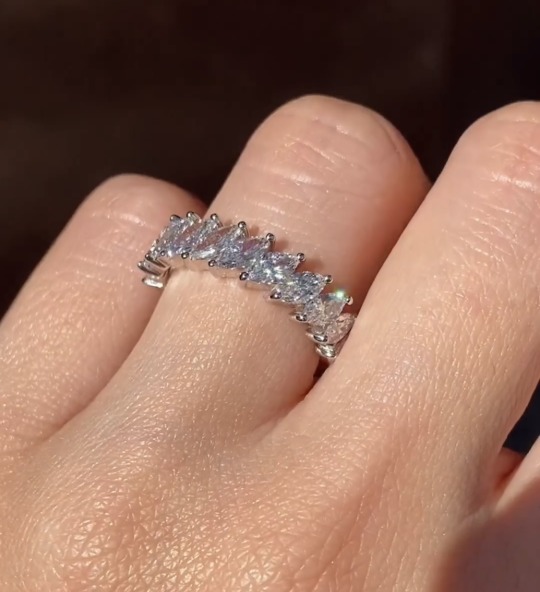
#diamond ring#engagement ring#personalized jewelry#jewellery#explore#gold rings#jewelry#vintage jewelry#fine jewelry#vintage rings#anniversary gifts#birthday gift#gift for wife#gift for her#mothers day gift#gift ideas#christmas gift#unique gifts#small business#handmade
5 notes
·
View notes
Text
"Buy me fur... not a coffee!"
Shop Now! www.buymefur.com
#buymefur#buy me fur#fur#furcoat#furlover#furlovers#fur coat#furlove#fur fashion#fur vest#fur hat#furfetish#thickfurlover#fur baby#fur stole#genuine fur#natural fur#real fur#unreal fur#faux fur#artificial fur#fauxfurcoat#mothers day gift#gift ideas#christmas gift#unique gifts#gift#holiday gifts#present#gift for women
23 notes
·
View notes
Text

https://sparkleshopstore.etsy.com
#kawaii#this is what makes us girls#gift for wife#birthday gift#fashion#gift for her#giftforfriends#unique gifts#gift ideas#gifts#mothers day gift#luxury#luxury gifts#etsy gifts#anniversary gifts#handmade gifts#gifts for her#free gifts#giftshop#gifts for women#christmas gift#birthday#sanriocore#sanrio#hello kitty
2 notes
·
View notes
Text

www.SuperTanya.com
#supertanya#sweater#mohair sweater#knitwear#gift ideas#mothers day gift#unique clothing#christmas gift
9 notes
·
View notes
